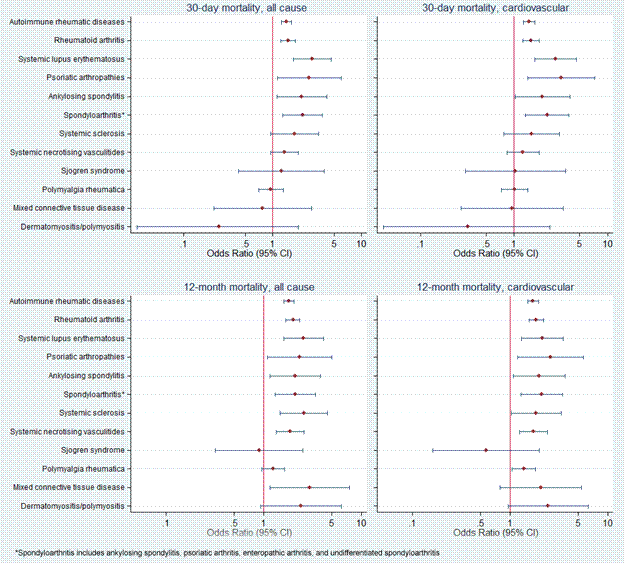Session Information
Session Type: Abstract Submissions (ACR)
Background/Purpose:
We have previously demonstrated increased case fatality following myocardial infarction (MI) in rheumatoid arthritis (RA) patients[1], however post-MI case fatality has not been investigated in other autoimmune rheumatic disease (AIRD). The primary aim of this study was to compare mortality rates following a first MI in patients with and without a diagnosis of AIRD . The secondary aims were to compare hospital readmission rates and post-MI revascularisation treatment.
Methods:
This was a retrospective cohort study using two population-based linked databases. Cases of MI from 1 July 2001 to 30 June 2007 were identified using International Classification of Diseases (ICD) codes. AIRD status was identified from the index admission or any prior admission in the preceding 3 years using relevant ICD codes. Thirty-day and 1-year mortality rates were calculated from the date of index MI to the date of death (all-cause and cardiovascular causes of death) for patients with AIRD and patients without AIRD (controls). Adjusted odds ratios for mortality were calculated using a logistic regression model fitted with mortality as the outcome, AIRD status as the exposure and with adjustment for age, gender, socio-economic status, geographic location and relevant co-morbidities. Readmissions were defined as admission to hospital within 1 year of the index MI. Procedure codes for percutaneous transluminal coronary angioplasty (PTCA) and coronary artery bypass graft (CABG) up to 90 days after the index MI were identified to compare intervention rates.
Results:
There were 79,390 individuals with a first MI, of whom 1,409 (1.8%) had AIRD. The 30-day all-cause mortality rate for patients with AIRD was 21.4% compared to 13.4% for controls (p < 0.001). At 1 year the AIRD group had an all-cause mortality of 38.6% compared to controls of 22.8% (p < 0.001). Adjusted odds ratios for mortality in the AIRD group and AIRD sub-groups are shown in Figure 1. Higher rates of readmissions at 30-days (p=0.004) and 1 year (p=0.003) were observed in the AIRD group compared to controls, but this was not sustained when considering only subsequent MIs as the cause of readmission. The 90-day rates of PTCA and CABG were significantly lower in the AIRD group compared to controls (PTCA: 15.7% vs 25.9%, p < 0.001 and CABG: 3.8% vs 8.7%, p < 0.001).
Conclusion:
We identified a higher risk-adjusted mortality rate for AIRD patients overall and for the majority of patient subgroups at 30-days and 12 months after first MI. We also identified higher readmission rates and lower post-MI revascularisation rates in the AIRD group, suggesting gaps in the current treatment of cardiovascular disease for AIRD patients.
1) Van Doornum et al, Arthritis Rheum. 2006
Figure 1 –Mortality Risk for AIRD patients who experienced a first MI between 1 July 2001- 30 June 2007
Disclosure:
S. Van Doornum,
None;
M. Bohensky,
None;
M. Tacey,
None;
C. Brand,
None;
V. Sundararajan,
None;
I. Wicks,
None.
« Back to 2013 ACR/ARHP Annual Meeting
ACR Meeting Abstracts - https://acrabstracts.org/abstract/mortality-rates-readmissions-and-revascularisation-following-a-first-myocardial-infarction-in-patients-with-autoimmune-rheumatic-disease-compared-with-controls/

